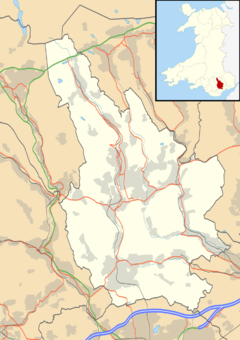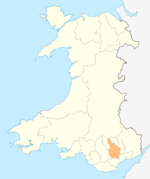Bargoed
| Bargoed | |
| Welsh: Bargod | |
 |
|
|
|
|
| Population | 11,900 (2011)[1] |
|---|---|
| OS grid reference | ST145995 |
| Principal area | Caerphilly |
| Ceremonial county | Gwent |
| Country | Wales |
| Sovereign state | United Kingdom |
| Post town | BARGOED |
| Postcode district | CF81 |
| Dialling code | 01443 |
| Police | Gwent |
| Fire | South Wales |
| Ambulance | Welsh |
| EU Parliament | Wales |
| UK Parliament | Caerphilly |
|
|
Lua error in package.lua at line 80: module 'strict' not found.
Bargoed (Welsh: Bargod) is a town in the Rhymney Valley, Wales, one of the South Wales Valleys. It lies on the Rhymney River in the county borough of Caerphilly and straddles the ancient boundary of Glamorgan and Monmouthshire, with Bargoed originally lying within the old county of Glamorganshire whereas Aberbargoed was in the old county of Monmouthshire. 'Greater Bargoed', as defined by the local authority Caerphilly County Borough Council, consists of the towns of Bargoed, Aberbargoed and the village of Gilfach. The combined population of these settlements is approximately 13,000.
Contents
Toponymy
The English meaning of the town's Welsh language name, Bargod, is border. Pronunciation of the town's name varies depending on street. There are many variations, from the standard Welsh Barr-god and English Bar-goyd to the informal Baa-Gud and Baa-Go-Ed.
History
Originally a market town, Bargoed grew into a substantial town following the opening of a colliery in 1903. By 1921 Bargoed had a population of 17,901; this has been steadily declining since that time, as the general demand for Welsh coal continued to fall. The colliery, which was the subject of a painting by L. S. Lowry, closed during the 1980s, and its former site is now a country park.
Governance
An electoral ward with the same name exists. At the 2011 census this ward had a population of 6,196.[2]
Redevelopment
The town has been undergoing a major redevelopment scheme, which included a bypass (running through the valley, with links to Bargoed town centre, Aberbargoed and Gilfach), Morrisons supermarket and petrol station, a new bus station, repaving the road though the heart of the town, a 400+ space car park, new library, 3 new offices, a relaxation area where the old bus station was on Hanbury Square, and 7 retail units. There are ongoing issues with plans for a state of the art Odeon Cinema and the site remains undeveloped (summer 2015).
The Grade II* listed Hanbury Street Baptist chapel has been converted into a public library which includes a council services helpdesk, a computer suite, a coffee lounge, and a scaled-down chapel; the pipe organ (now silent), occupies its original dominant position overlooking the main ground floor area, while the erstwhile chapel gallery houses a substantial collection of reference and other books. At the rear of the library a new mini park has been created using 40ft flower sculptures.
The sites of the former collieries of Bargoed, Gilfach, and Britannia have been landscaped as a recreational nature park with a network of paths on either side of the Rhymney river. Figures of mine workers from these three communities have become the inspiration for wooden sculptures in the park, while in Hanbury Square a group of three immense heads of colliery workers dominates the tiered piazza.
Transport
The town is served by Bargoed railway station with services to Cardiff, Penarth, and Barry; Bargoed Bus Interchange is situated at the northern end of the town, with local services and routes to nearby Blackwood, Ystrad Mynach, Caerphilly, and Newport among others. The A469 by-pass road connects with the A465 Heads of the Valleys road to the north and the A470 to the south, serving Cardiff and linking with the east-west Motorway M4.
Education
Bargoed Grammar Technical School existed as the local grammar school before Heolddu Comprehensive School was formed. Some of the grammar school's buildings in Park Crescent were used during from the 1980s until 2002 for the valley's first Welsh language comprehensive school, Ysgol Gyfun Cwm Rhymni, which has now moved to a new purpose-built site in Fleur-de-Lys. Primary Schools include St Gwladys Bargoed School, Park Primary School, Aberbargoed Primary School, Gilfach Fargoed Primary School and a Welsh school Ysgol Gymraeg Gilfach Fargod.
Notable people
- Actress Doris Hare (1905–2000) was born in Bargoed
- Bargoed is regularly namechecked during televised snooker tournaments as Mark Williams, Embassy World Snooker Champion in 2000 and 2003, practises his sport at the town's Emporium Snooker Hall.
- Welsh singer-songwriter and British Eurovision contestant James Fox grew up in Gilfach.
- Ivor Powell, former professional footballer and manager, was born in Gilfach-Bargoed on July 5, 1916.
- Alun Hoddinott, a composer of classical music, one of the first Welsh composers to receive international recognition.
- David Probert, British flat racing Champion Apprentice jockey 2008, attended Ysgol Gymraeg Gilfach Fargod also attended Ysgol Gyfun Cwm Rhymni, which was located in Bargoed and Aberbargoed until 2002, where a new building was constructed at Fleur de Lys.
- John Davies, Air Force mechanic, United Church minister and NDP of Canada candidate
- Justin Edwards (musician) - jazz musician and composer - went to Heolddu Comprehensive School.
- Dafydd Williams - Space Shuttle astronaut, whose father Bill was born in Bargoed but moved to Canada when he was 30, displayed the Welsh flag in space.
- Nathan Cleverly - Boxer - Grew up in Bargoed and went to Heolddu Comprehensive School.
- Only Boys Aloud - Welsh Group - Some boys attended Heolddu Comprehensive School.
- Howard Smith - British Olympic Bobsleigher, from John St, educated at Bargoed Grammar School and Heolddu Comprehensive. Competed at the 1984 Winter Olympics at Sarajevo in the 4 Man Bobsleigh.
- Morgan Phillips - General Secretary of the Labour Party 1944-1961. Brought up in Bargoed.
External links
References
The following are reference books on Bargoed by local author Paul James.
- Volume 1: The History of Bargoed and Gilfach in Photographs. ISBN 1-874538-31-X
- Volume 2: The History of Bargoed and Gilfach in Photographs. ISBN 1-874538-07-7
- Volume 3: The History of Bargoed, Gilfach and Aberbargoed in Photographs. ISBN 1-874538-64-6
All three books are published by Old Bakehouse Publications, Abertillery.


